- Home
- Richard Lee Byers
Unclean: The Haunted Lands Page 7
Unclean: The Haunted Lands Read online
Page 7
19–20 Mirtul, the Year of Risen Elfkin
Tsagoth heard the slaves when he and his fellow demons and devils were still some distance from the door. The mortals were banging on the other side of it and wailing, pleading for someone to let them out.
Their agitation was understandable, for in one respect at least, Aznar Thrul was a considerate master to the infernal guards the Red Wizards of Conjuration had given him. He’d ordered his human servants to determine the dietary preferences of each of the newcomers and to provide for each according to his desires.
Some of the nether spirits were happy to subsist on the same fare as the mortal contingent of the household. Others craved the raw flesh or blood of a fresh kill, preferably one they’d slaughtered themselves. A number even required the meat or gore of a human or other sentient being. Tsagoth currently stalked among the latter group as they headed in to supper.
Yes, he thought bitterly, everyone had exactly what he needed. Everyone but him, as the nagging hollowness in his belly, grown wearisome as the smarting, itching mark on his brow, attested.
The abyssal realms were vast, and the entities that populated them almost infinite in their diversity. Even demons couldn’t identify every other type of demon, nor devils every other sort of devil, thus no one had figured out precisely what manner of being Tsagoth truly was. But had he explained or demonstrated what he actually wanted in the way of a meal, that would almost certainly have given the game away.
A hezrou—a demon like a man-sized toad with spikes running down its back and arms and hands in place of forelegs—turned the handle and threw open the door. The slaves screamed and recoiled.
The hezrou sprang on a man, drove its claws into his chest, and carried him down beneath it. Other spirits seized their prey with the same brutal efficiency. Some, however, possessed a more refined sense of cruelty, and savoring their victims’ terror, slowly backed them up against the walls. An erinyes, a devil resembling a beautiful woman with feathered wings, alabaster skin, and radiant crimson eyes, cast a charm of fascination on the man she’d chosen. Afterward, he stood paralyzed, trembling, desire and dread warring in his face, as she glided toward him.
Tsagoth didn’t want to reveal his own psychic abilities, and in his present foul humor, tormenting the humans was a sport that held no interest for him. Like the toad demon and its ilk, he simply snatched up a woman and bit open her neck.
The slave’s bland, thin blood eased the dryness in his throat and the ache in his belly, but only to a degree. He contemplated the erinyes, now crouching over the body of her prey, tearing chunks of his flesh away and stuffing them in her mouth. How easy it would be to leap onto her back—
Yes, easy and suicidal. With an effort, he averted his gaze.
After their meal, the demons and devils dispersed, most returning to their duties, the rest wandering off in search of rest or amusement. Tsagoth prowled the chambers and corridors of the castle and tried to formulate a strategy that would carry him to his goal.
The dark powers knew, he needed a clever idea, because Aznar Thrul’s palace had proved to be full of secrets, hidden passages, magical wards, and servants who neither knew nor desired to know anything of the zulkir’s business except as it pertained to their own circumscribed responsibilities. How, then, was Tsagoth to ferret out the one particular secret that would allow him to satisfy his geas?
Somebody could tell him, of that he had no doubt, but he didn’t dare just go around questioning lackeys at random. His hypnotic powers, though formidable, occasionally met their match in a will of exceptional strength, and if he interrogated enough people, it was all but inevitable that someone would recall the experience afterward.
Thus, he at least needed to concentrate his efforts on those most likely to know, but what group was that exactly? It was hard to be certain when the intricacies of life in the palace were so strange to him. He’d rarely visited the mortal plane before, and even in his own domain, he was a solitary haunter of the wastelands, not a creature of castles and communities.
Perhaps because he’d just come from his own meager and unsatisfying repast, it occurred to him that he did comprehend one thing: Everyone, demon or human, required nourishment.
Accordingly, Tsagoth made his way to the kitchen, or complex of kitchens, an extensive open area warm with the heat of its enormous ovens and brick hearths. There sweating cooks peeled onions and chopped up chickens with cleavers. Bakers rolled out dough. Pigs roasted on spits, pots steamed and bubbled, and scullions scrubbed trays.
Tsagoth had an immediate sense that the activity in this precinct of the palace never stopped. It faltered, though, when a woman noticed him peering through the doorway. She squawked, jumped, and dropped a saucepan, which fell to the floor with a clank. Her coworkers turned to see what had startled her, and they blanched too.
The blood fiend realized he could scarcely question one of them with the others looking on. He stalked off but didn’t go far. Just a few paces away was a cold, drafty pantry with a marble counter and shelves climbing the walls. He slipped inside, deepened the ambient shadows to help conceal himself, and squatted down to wait.
Soon enough, a lone cook with a stained white apron and a dusting of flour on her face and hands scurried past, plainly in a hurry to accomplish some errand or other. It was the work of an instant to lunge out after her, clap one of his hands over her mouth and immobilize her with the other three, and haul her into the cupboard.
He stared into her wide, rolling eyes and stabbed with his will. She stopped struggling.
“I’m your master, and you’ll do as I command.” He uncovered her mouth. “Tell me you understand.”
“I understand.” She didn’t display a dazed, somnolent demeanor like that of the Red Wizard of Conjuration he’d controlled. Rather, she was alert and composed, as if performing a routine part of her duties for a superior who had no reason to feel displeased with her.
Tsagoth set her on the floor and let go of her. “Tell me how to find Mari Agneh.”
In her time, Mari Agneh had been tharchion of Priador, until Aznar Thrul decided to depose her and take the office for himself. Mari desperately wanted to retain her authority, and that, coupled with the fact that it was an unprecedented breach of custom for any one individual to be zulkir and tharchion both, impelled her to a profoundly reckless act: She’d appealed to Szass Tam and his allies among the mage-lords to help her keep her position.
But the lich saw no advantage to be gained by involving himself in her struggle, or perhaps he found it outrageous that any tharchion should seek to defy the will of any zulkir, even his principal rival. Either way, he declined to help her, and when Thrul learned of her petition, he was no longer content merely to usurp her office. He made her disappear.
Rumor had it that he’d taken her prisoner to abuse as his slave and sexual plaything, that she was still alive somewhere within the walls of this very citadel. Tsagoth fervently hoped that it was so. Otherwise, it would be impossible for him to fulfill his instructions, which meant he’d be trapped here forever.
The cook spread her hands. “I’m sorry, Master. I’ve heard the stories. Everyone has, but I don’t know anything.”
“If she’s here,” Tsagoth said, “she has to eat. Someone in the kitchen has to prepare her meals, and someone has to carry them to her.”
The cook frowned thoughtfully. “I suppose that’s true, but we fix so much food and send it all over the palace, day and night—”
“This is one meal,” Tsagoth said. “It’s prepared on a regular basis, and it goes somewhere no other meal goes. It’s likely the man who prepares it has never been told who ultimately receives it. If he does know, he hasn’t shared the secret with anyone else in the kitchen. Does that suggest anything to you?”
She shook her head. “I’m sorry, Master, no.”
Frustrated, he felt a sudden wayward urge to grab her again and yank the head off her shoulders, but tame demon that he supposedly was, he
couldn’t just slaughter whomever he wanted and leave the corpses lying around. Besides, she might still be useful.
“It’s all right,” he said, “but now that you know what to look for, you’ll watch. You won’t realize you’re watching or remember talking to me, but you’ll spy anyway, and if you discover anything, you’ll find me and tell me.”
“Yes, Master, anything you say.”
He sent her on her way, then crouched down and waited for the next lone kitchen worker to bustle by.
Aoth swung himself down off Brightwing and took a final glance around, making sure there were no horses in the immediate vicinity.
Divining his concern, the griffon snorted. “I can control myself.”
“Maybe, but the horses don’t know that.” He ruffled the feathers on her neck then tramped toward the big tent at the center of the camp. Cast in the stylized shape of a griffon, his shiny new gold medallion gleamed as it caught the light of the cook fires. The badge proclaimed him a newly minted officer, promoted for surviving the fall of Thazar Keep and carrying word of the disaster to his superiors.
The same accomplishment, if one was generous enough to call it that, made him the man of choice to scout the enemy’s movements, and he’d spent some time doing precisely that. Now it was time to report to the tharchion. Aware of his business, the sentry standing watch in front of the tent admitted him without a challenge.
Currently clad in the sort of quilted tunic warriors employed to keep their own metal armor from bruising their limbs, Nymia Focar, governor of Pyarados, was a handsome woman with a wide, sensuous mouth, several silver rings in each ear, and a stud in the left side of her nose. As he saluted, she said, “Griffon rider! After your errand, you must be hungry, or thirsty at the least. Please, refresh yourself.” She waved her hand at a folding camp table laden with bottles of wine, a loaf of bread, green grapes, white and yellow cheeses, and ham.
Her cordiality didn’t surprise him. She was often friendly and informal with her underlings, even to the point of taking them into her bed, though Aoth had never received such a summons. Perhaps his blunt features and short, thick frame were to blame. In any case, he was just as happy to be excused. Nymia had a way of turning into a ferocious disciplinarian when she encountered a setback, sometimes even flogging soldiers who’d played no part in whatever had gone amiss. He’d noticed that in such instances, it was often her former lovers who wound up tied to the whipping post.
“Thank you, Tharchion.” He was hungry, but not enough to essay the awkwardness of reporting and shoving food into his mouth at the same time. A drink seemed manageable, however, certainly safer than the risk of giving offense by spurning her hospitality, and he poured wine into one of the pewter goblets provided for the purpose. In the lamp-lit tent, the red vintage looked black. “I scouted the pass as ordered. Hundreds of undead are marching down the valley, in good order and on our side of the river.”
It was what she’d expected to hear, and she nodded. “Why in the name of the all-devouring flame is this happening?”
“I can only repeat what others have speculated already. There are old Raumviran strongholds, and the ruins of a kingdom even older up in the mountains. Both peoples apparently trafficked with abyssal powers, and such realms leave ghosts behind when they pass away.”
As Thay with its hosts of wizards conducting esoteric experiments would leave its stain when it passed, he reflected, then wondered where the morbid thought had come from.
“Once in a while,” he continued, “something skulks down from the ancient forts and tombs to trouble us, but we’ve never seen a horde the size of this, and I have no idea why it’s occurring now. Perhaps a true scholar might, but I’m just a battle mage.”
She smiled. “I wouldn’t trade you. Destroying the foul things is more important than understanding precisely where they came from or what agitated them. Is it your opinion that they intend to march straight through to engage us?”
“Yes, Tharchion.” He took a sip of his wine. It was sweeter than he liked but still drinkable. Probably it was costly and exquisite, if only he possessed the refined palate to appreciate it.
“Even though they can’t reach us before dawn?”
“Yes.”
“Good. In that case, we’ll have the advantages of a well-established position, daylight, and the Thazarim protecting our right flank. Perhaps the creatures aren’t as intelligent as we first thought.”
Aoth hesitated. Wizard and griffon rider though he was, he was wary of seeming to contradict his capricious commander, but it was his duty to share his perspective. It was why they were talking, after all.
“They seemed intelligent when they took Thazar Keep.”
“Essentially,” Nymia said, “they had the advantage of surprise. Your warning came too late to do any good. Besides, the warriors of the garrison were the least able in the tharch. I sent them to that posting because no one expected anything to happen there.”
He didn’t much like hearing her disparage men who had, for the most part, fought bravely and died horrific deaths in her service, but he was prudent enough not to say so. “I understand what you’re saying, Tharchion. I just think it’s important we remember that the enemy has organization and leadership. I told you about the nighthaunt.”
“The faceless thing with the horns and wings.”
“Yes.” Though he hadn’t known what to call it until a mage more learned than himself had told him. “A form of powerful undead generally believed extinct. I had the feeling it was the leader, or an officer at least.”
“If it impressed a griffon rider, I’m sure it’s nasty, but I have all the warriors I could gather on short notice and every priest I could haul out of his shrine. We’ll smash this foe, never doubt it.”
“I don’t, Tharchion.” Truly he didn’t, or at least he knew he shouldn’t. Her analysis of the tactical situation appeared sound, and he trusted in the valor and competence of his comrades. Maybe it was simply fatigue or his memories of the massacre at Thazar Keep that had afflicted him with this edgy, uncharacteristic sense of foreboding. “What will you do if the undead decide to stop short of engaging us?”
“Then we’ll advance and attack them. With any luck at all, we should be able to do it before sunset. I want this matter finished quickly, the pass cleared and Thazar Keep retaken. Until they are, no gems or ores can come down from the mines, and there won’t be any treasure hunters heading up into the peaks for us to tax.”
Nor safety or fresh provisions for any miners, trappers, and crofters who yet survive in the vale, Aoth thought. She’s right; it is important to crush this enemy quickly.
“Do you have anything else to report?” Nymia asked.
He took a moment to consider. “No, Tharchion.”
“Go and rest then. I want you fresh when it’s time to fight.”
He saw to Brightwing’s needs, then wrapped himself in his bedroll and attempted to do as his commander had suggested. After a time, he did doze, but he woke with the jangled nerves of one who’d dreamed unpleasant dreams.
It was the bustle of the camp that had roused him to a morning so thoroughly overcast as to mask any trace of the sun in the eastern sky. Sergeants tramped about shouting. Warriors pulled and strapped on their armor, lined up before the cooks’ cauldrons for a ladle full of porridge, kneeled to receive a cleric’s blessing, or honed their swords and spears with whetstones. A blood orc, eager for the fight to come, howled its war cry, and donkeys hee-hawed, shied, and pulled at their tethers. A young human soldier attempting to tend the animals wheeled and cursed the orc, and it laughed and made a lewd gesture in response.
Aoth wondered whether an undead spellcaster had sealed away the sun and why no one on his side, a druid or warlock adept at weather-craft, had broken up the cloud cover. If no one could, it seemed a bad omen for the conflict to come.
He spat. He was no great hand at divination and wouldn’t know a portent if it crawled up his nose. He was simply nervous
, that was all, and the best cure for that was activity.
Accordingly, he procured his breakfast and Brightwing’s, performed his meditations and prepared the day’s allotment of spells, made sure his weapons and talismans were in perfect order, then roamed in search of the scouts who had flown out subsequent to his return. He wanted to find out what they’d observed.
As it turned out, nothing of consequence, but the effort kept him occupied until someone shouted that the undead were coming. Then it was time to hurry back to Brightwing, saddle her, and wait for his captain to order him and his comrades aloft.
When the command came, the griffons sprang into the air with a thunderous snapping and clattering of wings. As Brightwing climbed, Aoth studied the enemy. The light of morning, blighted though it was, afforded him a better look than he’d enjoyed hitherto, even when availing himself of his familiar’s senses.
It didn’t look as if the undead had the Thayan defenders outnumbered. That at least was a relief. Aoth just wished he weren’t seeing so many creatures that he, a reasonably well-trained warlock even if no one had ever seen fit to offer him a red robe, couldn’t identify. It was easier to fight an adversary if you knew its weaknesses and capabilities.
A hulking, gray-skinned corpse-thing like a monstrously obese ghoul waddled in the front ranks of the undead host. From time to time, its jaw dropped halfway to its navel. It looked like, should it care to, it could stuff a whole human body into its mouth. Aoth scrutinized it, trying to associate it with something, any bit of lore, from his arcane studies, then realized he could no longer see it as clearly as he had a moment before.
The morning was growing darker instead of lighter. The clouds had already crippled the sunlight, and now some power was leeching away what remained. He thought of the nighthaunt, a being seemingly made of darkness, and was somehow certain it was responsible. He tried not to shiver.
Every Thayan warrior was accustomed to sorcery and had at least some familiarity with the undead. Still, a murmur of dismay rose from the battle formation below. Officers and sergeants shouted, reassuring the common soldiers and commanding them to stand fast. Then the enemies on the ground began to lope, and dangerously difficult to discern against the darkened sky, the flying undead hurtled forward.

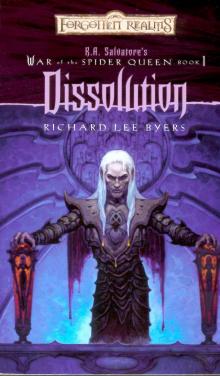 Dissolution
Dissolution Arkham Horror- Ire of the Void
Arkham Horror- Ire of the Void The Haunted Lands: Book II - Undead
The Haunted Lands: Book II - Undead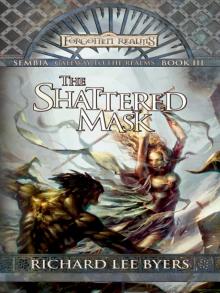 The Shattered Mask
The Shattered Mask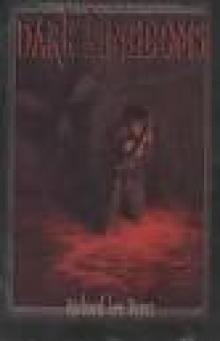 Dark Kingdoms
Dark Kingdoms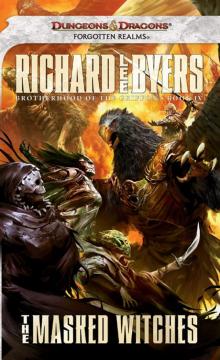 The Masked Witches: Brotherhood of the Griffon, Book IV
The Masked Witches: Brotherhood of the Griffon, Book IV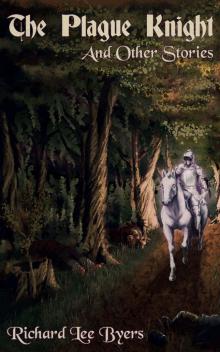 The Plague Knight and Other Stories
The Plague Knight and Other Stories Unclean: The Haunted Lands
Unclean: The Haunted Lands The Captive Flame: Brotherhood of the Griffon • Book 1
The Captive Flame: Brotherhood of the Griffon • Book 1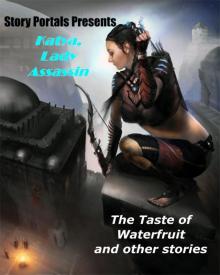 The Taste of Waterfruit and Other Stories (Story Portals)
The Taste of Waterfruit and Other Stories (Story Portals)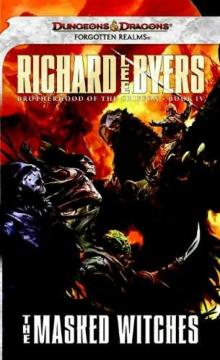 The masked witches botg-4
The masked witches botg-4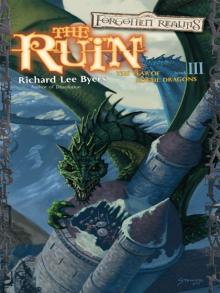 The Ruin
The Ruin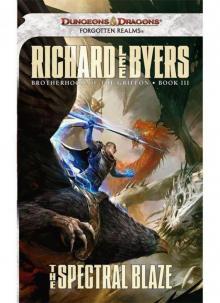 The Spectral Blaze botg-3
The Spectral Blaze botg-3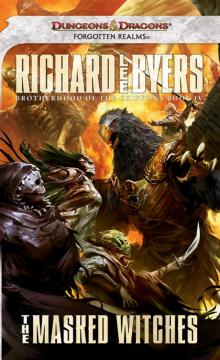 The Masked Witches
The Masked Witches Blind God's bluff bf-1
Blind God's bluff bf-1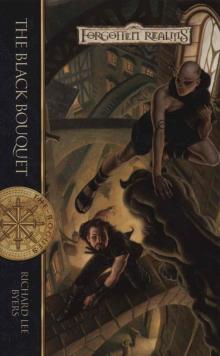 The Black Bouquet r-2
The Black Bouquet r-2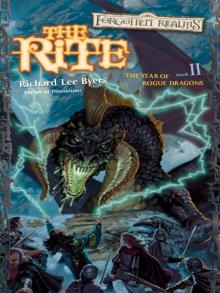 The Rite
The Rite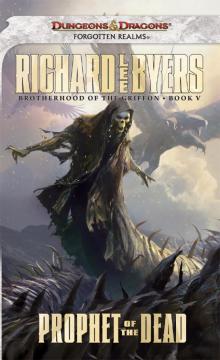 Prophet of the Dead: Forgotten Realms
Prophet of the Dead: Forgotten Realms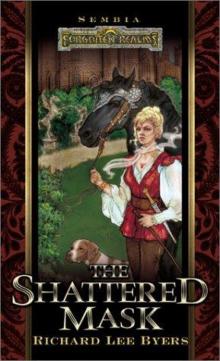 The Shattered Mask s-3
The Shattered Mask s-3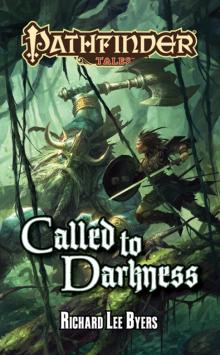 Called to Darkness
Called to Darkness Undead hl-2
Undead hl-2 Blind God's Bluff: A Billy Fox Novel
Blind God's Bluff: A Billy Fox Novel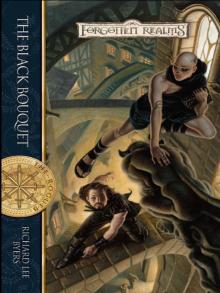 The Black Bouquet
The Black Bouquet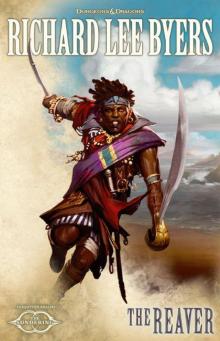 The Reaver
The Reaver The Spectral Blaze: A Forgotten Realms Novel
The Spectral Blaze: A Forgotten Realms Novel Queen of the Depths
Queen of the Depths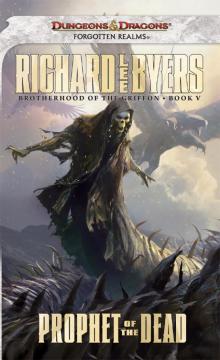 Prophet of the Dead botg-5
Prophet of the Dead botg-5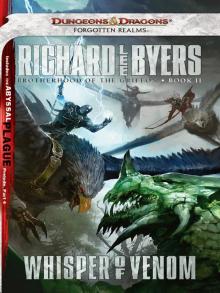 Whisper of Venom: Brotherhood of the Griffon, Book II
Whisper of Venom: Brotherhood of the Griffon, Book II The Captive Flame botg-1
The Captive Flame botg-1 The Haunted Lands: Book III - Unholy
The Haunted Lands: Book III - Unholy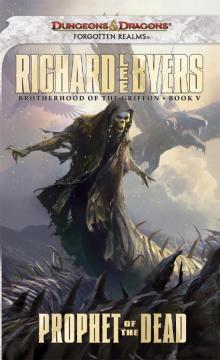 Prophet of the Dead
Prophet of the Dead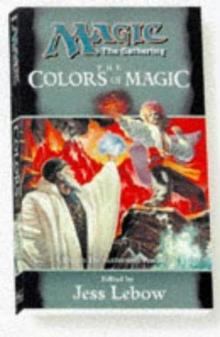 The Colors of Magic Anthology (magic: the gathering)
The Colors of Magic Anthology (magic: the gathering) Unholy hl-3
Unholy hl-3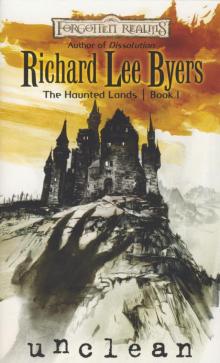 Unclean hl-1
Unclean hl-1 Blind God's Bluff
Blind God's Bluff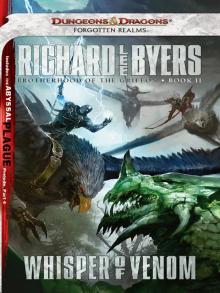 Whisper of Venom botg-2
Whisper of Venom botg-2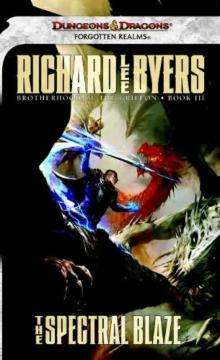 The Spectral Blaze
The Spectral Blaze